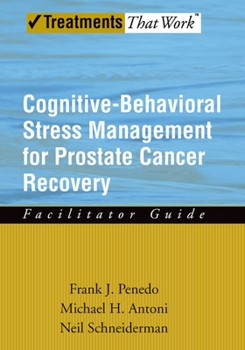Cognitive-Behavioral Stress Management for Prostate Cancer Recovery Facilitator Guide
Men treated for localized prostate cancer have an excellent medical prognosis, but may have difficulty readjusting to life after surgery as a result of treatment related side effects. Changes in physical functioning and ongoing PSA monitoring due to the possibility of recurrence may bring added stress. Effective stress management is a key factor in increasing quality of life in this population and may play a role in maintaining overall health.
Cognitive Behavioral Stress Management (CBSM) and relaxation training constitute the two components of this comprehensive program. Each session provides participants with stress management skills, including cognitive restructuring, coping strategies, and social support. Participants practice a variety of relaxation methods, such as progressive muscle relaxation, imagery, and meditation. Relevant issues for men having had prostate cancer, such as sexuality and communication, are also addressed.
This guide is designed to be used in conjunction with the corresponding workbook, which includes in-session exercises, monitoring forms, and homework assignments. Group meetings combined with home practice facilitate the application of effective stress management and relaxation techniques to the everyday lives of participants. Together, the guide and workbook include all the material and information needed to successfully implement this program.
TreatmentsThatWorkTM represents the gold standard of behavioral healthcare interventions
- All programs have been rigorously tested in clinical trials and are backed by years of research
- A prestigious scientific advisory board, led by series Editor-In-Chief David H. Barlow, reviews and evaluates each intervention to ensure that it meets the highest standard of evidence so you can be confident that you are using the most effective treatment available to date
- Our books are reliable and effective and make it easy for you to provide your clients with the best care available
- Our corresponding workbooks contain psychoeducational information, forms and worksheets, and homework assignments to keep clients engaged and motivated
- A companion website (www.oup.com/us/ttw) offers downloadable clinical tools and helpful resources
- Continuing Education (CE) Credits are now available on select titles in collaboration with PsychoEducational Resources, Inc. (PER)





